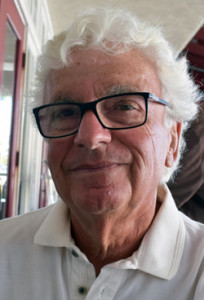
CALGARY, Alberta, Canada — Marcel Marceau, famed French mime, passed away on September 22, 2007 Yom Kippur, at the age of 84.
While most remember Marceau as the preeminent performer of silent art; the unsurpassed entertainer who could say more with silence than an actor with volumes of lines; the incomparable artist who could make his audience laugh or smile with merely a facial expression; the matchless player who toured in over 65 countries; the goodwill ambassador for the United Nations; the recipient of numerous awards and honors for his artistry, I remember Marcel Marceau as a Jewish hero of the French Resistance.
Marcel Mangel was born on March 22, 1923 in Strasbourg, France, the son of Charles Mangel, a kosher butcher. At the age of 4, the Mangel family moved to Lille but returned to Strasbourg prior to World War II. Marcel’s childhood was normal. He attended school, learned to speak English in addition to his native French, was introduced to the world of music and theater by his father who loved to sing, went to the movies where he developed a fondness for Buster Keaton, Charlie Chaplin and the Marx brothers and was gifted in gymnastics, acting, drawing and painting.
Everything changed on September 1, 1939 when the Nazis invaded Poland. Two days later Britain, Australia, New Zealand and France declared war on Germany. Anticipating the impending German invasion, the City of Strasbourg located in northeast France on its border with Germany, was immediately evacuated, the entire population, including the Mangel family, fleeing to southwest France. One of the first official acts of the Nazis upon occupying Strasbourg was to burn its main synagogue, an architectural landmark and one of the largest in Europe.
Marcel and his older brother Alain, in order to hide their Jewish identity from the Nazis, adopted the last name, Marceau. That name was not chosen at random but was the name of revolutionary general, Francois Severin Marceau-Desgraviers who participated in the storming of the Bastille, the opening salvo of the French Revolution, which would free the French people from the yoke of oppressive, absolute monarchy. The French Revolution with its rallying cry of “Liberte, egalite, fraternite, ou la mort!” (Freedom, equality, brotherhood or death!) would symbolize the endeavor that Marcel Marceau was about to embark upon.
The Marceau brothers made their way to Limoges, famous for its 19th century porcelain, but then a hotbed of underground resistance against the Nazi invaders. Marcel and Alain joined the French Resistance, the loose group of anti-German resistance units that would make a crucial contribution to the eventual liberation of France.
While in the French Resistance, Marcel used his drawing skills to alter the identity cards of Jewish children by changing their birth dates so that the Nazis would think that they were too young to be deported to concentration camps.
He used his acting skills by donning the uniform of a Scoutmaster and supposedly leading Boy Scout troops on mountain hikes but in reality smuggling Jewish children into the safety of Switzerland. Of the danger, Marcel later recalled: “Sometimes I woke up sweating thinking we were in front of a firing squad.”
His acting skills were also useful near the end of the war when he and another resistance member stumbled upon a group of German soldiers. Marcel convinced the group that he and his friend were the advance contingent of a large French force. He then watched with amazement as the Germans surrendered.
Near the end of the occupation, Marcel moved to Paris where he helped in a children’s home. The home hid 30 Jewish children living under false identities.
As a Jew, if captured, Marcel Marceau, was subject to deportation to a concentration camp and almost certain death. Worse, if caught, as a member of the French Resistance, he would have been first tortured by the dreaded Gestapo, the secret police of Nazi Germany and then executed.
On one occasion in 1944, the Germans almost captured Marcel while he was exiting the Metro. Two plain-clothes police officers stopped and questioned him and demanded to see his papers, which were forgeries. Only his talent as an actor saved him as he convinced the officers of the bona fides of his fake identity.
Marcel’s father was not so fortunate. In 1944, the Gestapo captured him and shipped him in a cattle car to Auschwitz from where he never returned.
After the liberation of Paris, Marcel joined Charles de Gaulle’s Free French Forces who were fighting along side the other allied troops in their march across France and into Germany. Because of his excellent English, he was seconded as a liaison officer to General Patton’s U.S. Third Army.
Marceau was demobilized in 1946 and then formally studied acting and mime, the beginning of his illustrious 50-year career as a silent performer. Marceau speculated that his unconscious choice of mime was perhaps drawn from the silence of the returning survivors from the death camps who could not speak, who did not know how to recount their ordeals.
When asked of his father’s death, Marceau said: “Yes I cried for him”. But he also spoke of the children lost to the Holocaust: “Among those kids was maybe an Einstein, a Mozart, somebody who (would have) found a cancer drug.” With Marceau it was always the children.
The Nazis murdered some 11,400 French Jewish children. More would have perished if not for Marcel Marceau.
*
Spier is a retired lawyer with a keen interest in Jewish history. You may contact him via joe.spier@sdjewishworld.com. San Diego Jewish World’s eulogy series is sponsored by Marc and Margaret Cohen in memory of Molly Cohen, and by Inland Industries Group LP in memory of long-time San Diego Jewish community leader Marie (Mrs. Gabriel) Berg. Comments below MUST be accompanied by the letter writer’s first and last name and his or her city and state of residence (city and country for those outside the U.S.)